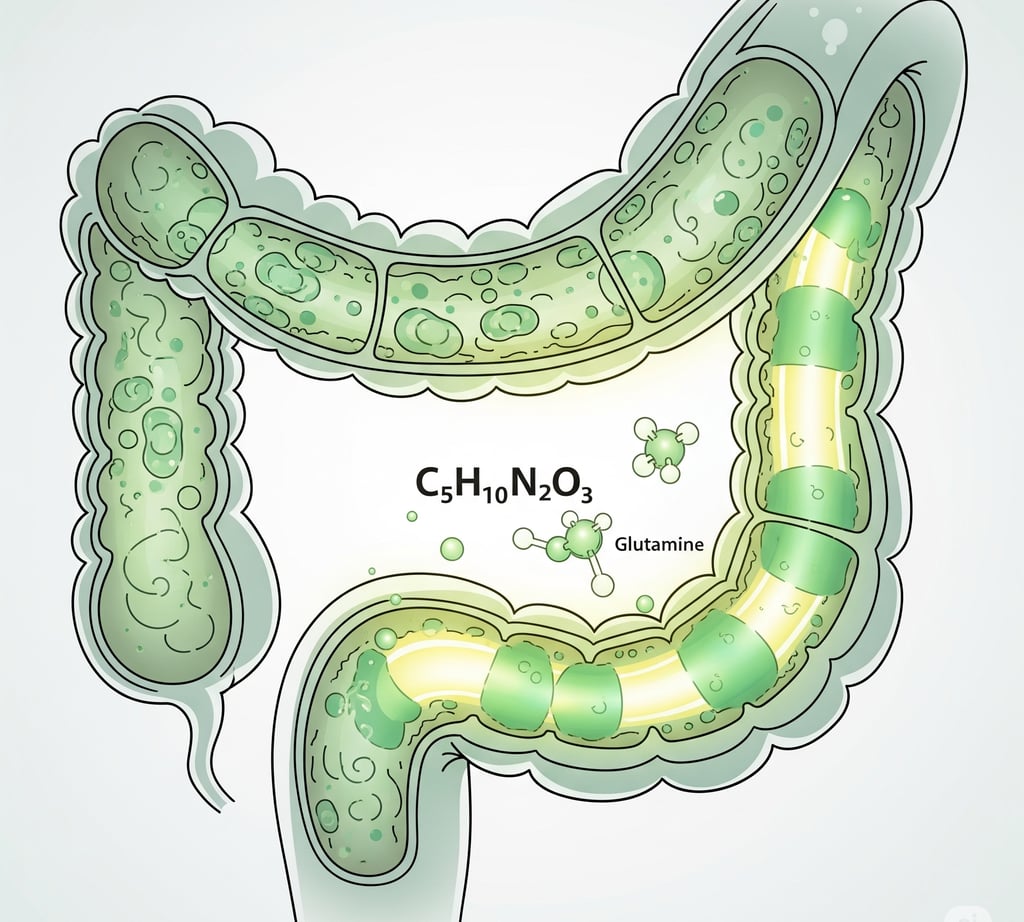Glutamine and gut permeability: the solution you were waiting for?
Is glutamine a new solution for preventing intestinal diseases such as irritable bowel syndrome?, a new study answers
GLUTAMINE
Nuri El azem De haro
8/28/20254 min read


I'm sure you've heard of "leaky gut." It's a term that's becoming more common in conversations about digestive health, overall wellness, and even athletic performance. And along with it, a star supplement: glutamine.
It's promoted as the ultimate repairer of the intestinal barrier. But how much of this is true? Is it really the solution it promises to be? Today we're going to analyze it under the microscope of science, based on a recent systematic review and meta-analysis published in the journal Amino Acids in 2024. Fatemeh Abbasi, Mohammad Mehdi Haghighat Lari, Gholamreza Reza Khosravi, Elahe Mansouri, Nastaran Payandeh, Alireza Milajerdi. A systematic review and meta-analysis of clinical trials on the effects of glutamine supplementation on gut permeability in adults. Amino Acids. 2024 Oct 13;56(1):60, which has evaluated the most relevant clinical studies on the topic. Let's break down the results! 🧑🔬
What Exactly is Intestinal Permeability?
Imagine that your intestinal wall is like a very sophisticated protective wall. This wall is made up of a single layer of cells (epithelial cells) joined together by structures called "tight junctions," which act as the cement between the bricks.
The function of this barrier is two-fold: on one hand, to allow the absorption of vital nutrients and, on the other, to prevent harmful substances like toxins or microbes from passing into the bloodstream.
Increased intestinal permeability occurs when that "cement" weakens and the wall becomes "porous" or permeable.
What are the Symptoms and Consequences?
When the intestinal barrier fails, the consequences can go beyond a simple digestive discomfort. According to scientific evidence, an increase in permeability can cause:
Passage of toxins into the blood: Endotoxins and exotoxins can cross the intestinal barrier and enter circulation.
Systemic inflammation: The presence of these toxins in the blood can trigger an immune system response and generate a state of chronic inflammation in the body.
Poor nutrient absorption: A damaged intestine cannot perform its function of efficiently absorbing nutrients.
Factors such as stress, certain infections, or diets rich in fats and sugars can damage this protective barrier.
The Role of Glutamine: The Intestine's "Fuel"
This is where glutamine comes into play. Glutamine is an amino acid that plays a fundamental role in our intestinal health. In fact, it is the main fuel that intestinal cells (enterocytes) and immune cells use to function and regenerate.
Science has shown that glutamine helps maintain the integrity of the intestinal barrier by promoting the expression of the proteins that form the "tight junctions" (the "cement" of our wall). When we suffer from an infection or an illness, glutamine levels can decrease, which weakens the barrier and increases permeability.
The Scientific Evidence: Does Glutamine Really Work?
This is the million-dollar question. The 2024 meta-analysis, which combined the results of 10 clinical trials with 352 participants, reached a main conclusion that might surprise you.
In general, when analyzing all the studies together, glutamine supplementation did not show a significant effect in reducing intestinal permeability.
But wait! This is where it gets interesting. 👀 The researchers decided to analyze the data further, separating it into subgroups, and found very important nuances:
Dose Matters (a lot): A significant reduction in intestinal permeability was observed only in studies that used glutamine doses greater than 30 grams per day. Lower doses did not show a relevant effect.
Duration of Use Also Matters: Interestingly, the positive effect was found in interventions that lasted less than 2 weeks. Studies with a duration greater than 4 weeks showed no significant benefits.
This suggests that a short but intense treatment, with high doses, could be the key.
A Critical Look: Limitations and Next Steps
Although these results are promising, the authors of the study themselves urge caution. It is essential to consider the limitations:
Small Study Sample: The analysis included a total of 352 people, which is a relatively low number and forces us to interpret the results with caution.
Specific Populations: The study participants were not healthy people, but patients with various pathologies such as Crohn's disease, HIV, pancreatitis, or cancer, among others. Therefore, we do not know if these results would apply to a general healthy population.
More Research is Needed: More studies are needed with different doses, durations, and in different populations to be able to establish a clear and safe recommendation.
Conclusion
So, is glutamine the solution for leaky gut? The answer is not a simple yes or no.
Current scientific evidence suggests that it is not a magical universal cure. However, supplementation with high doses (greater than 30 g/day) for a short period (less than 2 weeks) seems promising for reducing intestinal permeability in certain conditions.
It is a fascinating field of research, but still in development. If you are considering taking glutamine, click on the link below to find the most suitable glutamine for you. If you have any doubt, feel free to contact me and I will help you out!.
Frequently Asked Questions (FAQ)
1. What exactly is "leaky gut"?
It is a non-medical term that describes an increase in the permeability of the intestinal barrier. This means that the junctions between the cells of the intestine weaken, allowing unwanted substances to pass into the bloodstream, which can cause inflammation.
2. So, does glutamine cure leaky gut?
According to the evidence analyzed, it cannot be said to "cure" it. The overall study did not find a significant effect. However, high doses (>30 g/day) for short periods (<2 weeks) did show an improvement in permeability in patients with certain diseases.
3. What dose of glutamine is considered effective according to this study?
The study found that doses greater than 30 grams per day were the ones that achieved a significant reduction in intestinal permeability.
4. How long should I take glutamine for intestinal permeability?
Surprisingly, the benefits were observed in interventions of less than 2 weeks. More research is needed to understand why a shorter treatment seems to be more effective.
5. Is it safe to take such high doses of glutamine?
This study did not evaluate the safety of high doses. Such a high intake of any supplement should always be supervised by a health professional, as it may not be suitable for everyone. Do not self-medicate.
6. Do the results of this study apply to healthy people?
Not necessarily. The participants in the analyzed studies suffered from various diseases. More research is needed to know if glutamine has the same effects on healthy people who may have intestinal permeability due to other causes, such as intense exercise or stress.
